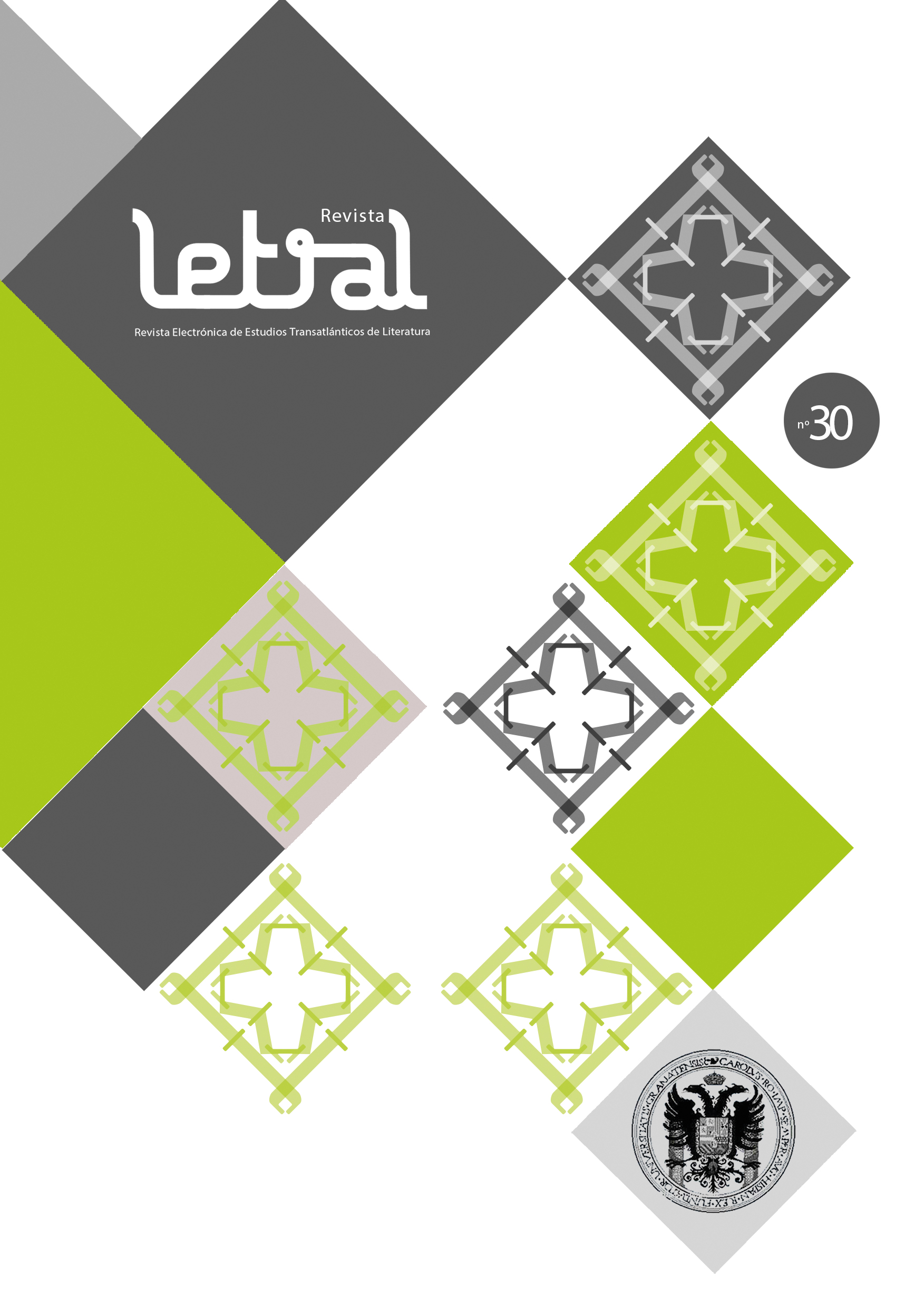Female Voice, Transgression of Patriarchal Stereotyoes and New Forms of Identity Through Language in Signs Preceding the End of the World, by Yuri Herrera
DOI:
https://doi.org/10.30827/rl.vi30.26673Keywords:
Yuri Herrera, Signs Preceding the End of the World, Mexican narrative, border, language, feminismAbstract
Yuri Herrera, mexican novelist, has configured a personal universe through a narrative proposal fundamentally based on a very peculiar relationship with language and on the subversion/questioning of pre-assigned stereotypes about violence, identity, gender and narrative spaces. Signs preceding the end of the world (2009) is a circular journey, mythical and real, of a woman, Makina, translator of languages and realities, who crosses the border between two spaces that without naming each other refer to Mexico and the United States in search of her brother. In this initiatory and terrible journey we will have the opportunity to see how the rewriting of pre-Hispanic myths and their reappropriation allow the powerful female character to subvert all the expected stereotypes about a single woman who undertakes such a dangerous journey. Makina is a non-victim who not only empowers, resists and survives, but also delivers an undeniable message upon reaching her destination.
Downloads
References
Alvstad, Cecilia. “Anthropology over Aesthetics: On the Poetics of Movement and Multilingualism in Three Translations of Yuri Herrera’s Señales que precederán al fin del mundo”. Literatura latinoamericana mundial, Gustavo Guerrero, Jorge J. Locane, Benjamin Loy and Gesine Müller (eds). Berlín, De Gruyter, Berlín, pp. 223-241.
Bhabha, Homi. Nuevas minorías, nuevos derechos: Notas sobre cosmopolitismos vernáculos. México, Siglo 21, 2013.
Carabí, Àngels y Armengol, Josep M. (eds.). La masculinidad a debate. Barcelona, Icaria, 2008.
Carini, Sara. “Identidades fronterizas a través del lenguaje en Trabajos del Reino y Señales que precederán al fin del mundo de Yuri Herrera”. Ogigia, n.º 12, 2012, pp. 45-57.
Colanzi, Liliana. “Entrevista a Yuri Herrera”. Americas Quarterly, 5 de febrero de 2010. En la Frontera: Una Conversación con el Escritor Mexicano Yuri Herrera - Americas Quarterly. Accedido 10 de septiembre de 2022.
Herrera, Yuri. Trabajos del reino. Cáceres, Periférica, 2008.
Herrera, Yuri. Señales que precederán al fin del mundo. Cáceres, Periférica, 2009.
Herrera, Yuri. La transmigración de los cuerpos. Cáceres, Periférica, 2013.
García Sánchez, Nayeli. “Yuri Herrera: escribir es responder a nuestros hallazgos del mundo”. Literal, 2017. Yuri Herrera: escribir es responder a nuestros hallazgos del mundo - Literal Magazine. Accedido 15 de septiembre de 2022.
hooks, bell. El deseo de cambiar. Hombres, masculinidad y amor. Barcelona. Bellatera. 2021.
Iñiguez Rodríguez, Edgardo. “Mito, violencia y necroescrituras en Señales que precederán al fin del mundo de Yuri Herrera”. Mitologías hoy, n.º 19, 2019, pp. 233-244.
Manrique Sabogal, Winston. “Entrevista a Yuri Herrera”. El País. 8 de febrero de 2013. Yuri Herrera: “No tenemos que permitir que los políticos nos expropien la lengua” | Cultura | EL PAÍS (elpais.com) Accedido 5 de octubre de 2022.
Moi, Toril. Teoría literaria feminista. Madrid, Cátedra, 1999.
Neuhén, Tes. “Entrevista a Andrés Neuman”. Poemas del alma. 13 de abril de 2018. Entrevista a Andrés Neuman (Primera Parte) > Poemas del Alma (poemas-del-alma.com) Accedido 10 de octubre de 2022.
Rivera Garza, Cristina. Escrituras geológicas. Madrid, Iberoamericana /Vervuert, 2022.
Rodriguez J, Jaime. Solo quedamos nosotros. Barcelona, Galaxia, 2021.
Sanz, Marta. Monstruas y centauras. Barcelona, Anagrama, 2018.
Serra, Clara. “La víctima, protagonista de nuestro tiempo”. El País, 9 de octubre de 2022. Feminismo: La víctima, protagonista de nuestro tiempo | Opinión | EL PAÍS (elpais.com) Accedido 10 de octubre de 2022.
Spivak, Gayatri Chakravorty, and Santiago Giraldo. "¿Puede hablar el subalterno?" Revista colombiana de antropología, n.º 39, 2003, pp. 297-364.
Stefkova, Radmika y Figueroa, Rodrigo. “Una entrevista a Yuri Herrera”. Latin American Literatura Today. Universidad de Oklahoma, 2015. “Creo que la literatura entraña siempre una responsabilidad política”: Una entrevista a Yuri Herrera por Radmila Stefkova y Rodrigo Figueroaa - LALT (latinamericanliteraturetoday.org) Accedido 5 de octubre de 2022.
Vázquez, Paola. “Entrevista a Yuri Herrera”. Pasaporte sellado. Cruzando las fronteras entre ciencias sociales y literatura, Alberto Trejo Amezcua y Gilda Waldman Mitnick (coords.), Ciudad de México, UAM-Xochimilco, 2018, pp. 311-313.
Ripetta, María Elena. “Entrevista a Andrés Neuman”. Bae Negocios, mayo de 2020. Andrés Neuman: "En nuestro cuerpo se juegan placeres, dolores, miradas, miedos" | BAE Negocios Accedido 20 de octubre de 2022.
Vega Ramos, María José. Imperios de papel. Introducción a la crítica postcolonial. Barcelona, Crítica, 2003.
Downloads
Published
How to Cite
Issue
Section
License
Revista Letral is an open access journal under a Creative Commons Atribución-NoComercial 4.0 license.
The works published in this journal may be reused, distributed and publicly presented for non-commercial purposes, provided that: cite the authorship and the original source of the publication (journal, publisher and URL of the work).
We strongly recommended you to share our published articles in social and scientific networks, institutional and public repositories, personal or institutional websites, blogs, Google Scholar, ORCID, ResearchID, ScopusID, etc.
The journal allow the author(s) to hold the copyright and to retain publishing rights without restrictions.
We are completely free, both for readers and authors.














